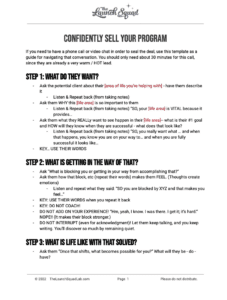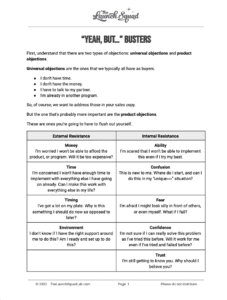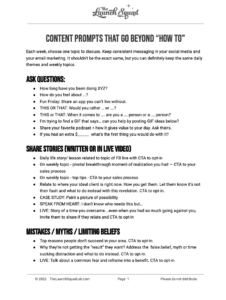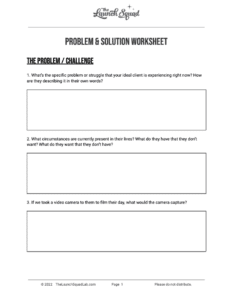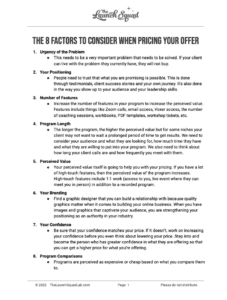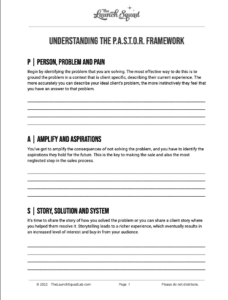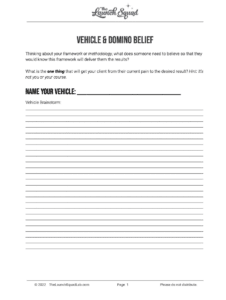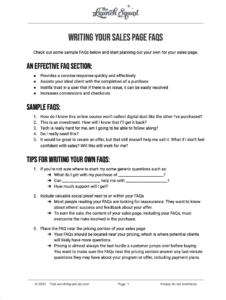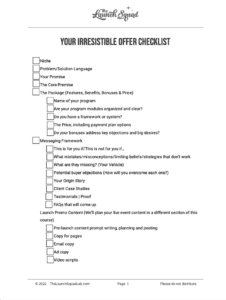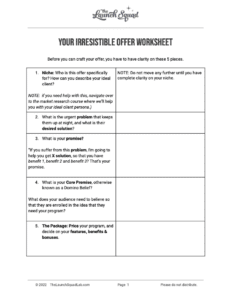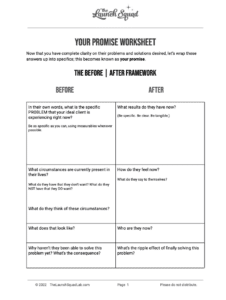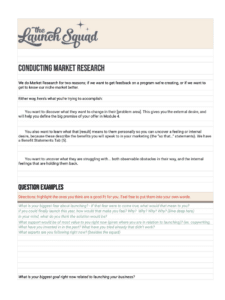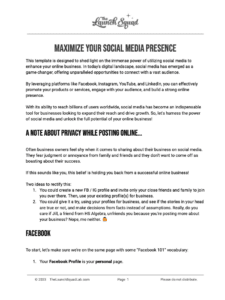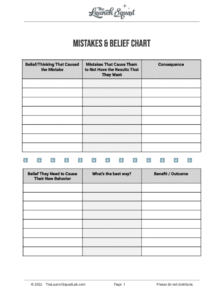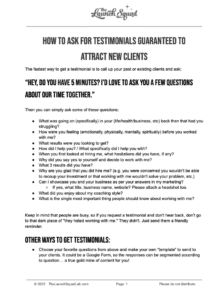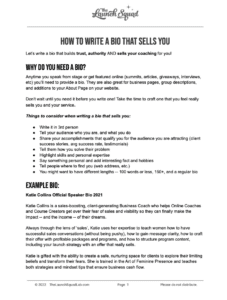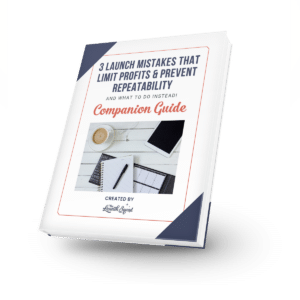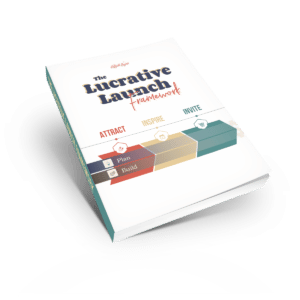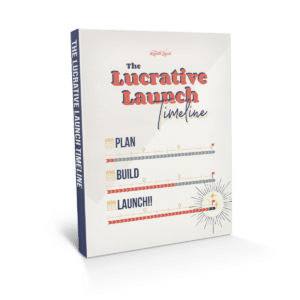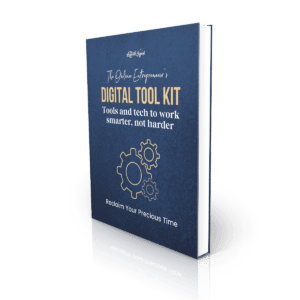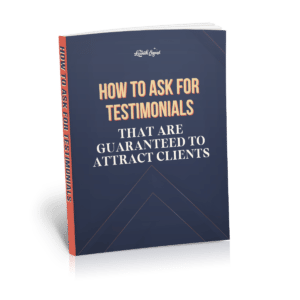Here are three common launch mistakes we see all the time. Whether you didn’t make the money you were hoping for or the launch just felt completely overwhelming, chances are, you were plagued by one or more of these mistakes. Check out this episode to find out what these mistakes are, how to notice when they pop up, and how you can avoid them during your next launch.
Grab our Market research min-course here!
[00:00:00] Jeffrey: Welcome to the light new launch podcast. Today, we're talking about how to overcome the three launch mistakes that limit profits and prevent repeatability. Stay tuned.
[00:00:57] Jeffrey: Welcome back to the show. I'm Jeffrey summer. I'm back again with Katie Collins. And today we want to talk about three common launch mistakes. We see all the time, whether they didn't make the money they were hoping for, or the launches felt completely overwhelmed.
Chances are, they were plagued by one or more of these mistakes. Katie, the third mistake is really in your lane. Could you start us off with that?
[00:01:21] Katie: Yes, this one is really all about the money. raise your hand. If you wanna make money.
[00:01:30] Jeffrey: amen. Sister.
[00:01:33] Katie: So mistaken. Number three is, um, really about your offer. It's not being super clear on your transformation, um, or not being clear on your audience and their desires. And so you're frankly, making an offer that is not irresistible.
It's kind of a, yeah. Is not irresistible, double negative. I don't know. Anyway, um, you, you, when you put your offer out there and it doesn't sell well, you might be making up a story about yourself or making up a story about your potential clients, or you might be making up a story about your ability to launch or to launch.
and the truth is it's probably not the case, thankfully. Right. It's probably that you're really not communicating the value of your offer. Well enough. And so the question always is, is this offer actually irresistible? So. If you're thinking, oh, this might be one of my mistakes. Here are some symptoms that you may be experiencing.
Um, when your launch sales were low, last time you may have, you know, made up stories about yourself or your business or your capabilities. You might even have called yourself an imposter. Um, you may have a belief that your potential clients just don't wanna invest in themselves. Right. We often do a niche switch after a failed launch, like, oh, Nope.
That audience, you know, they're not good for some reason. Um, you may find that your pages aren't converting very well and people are not signing up for your events. They don't frankly seem interested in what you have to offer. Um, you may be experiencing low. Um, email open rates or a low number of views on your Facebook lives.
Um, you may feel unclear about your pricing, um, any objections that they may have, or your bonuses, like you may just not be certain about them, or maybe you kind of through in some random bonuses instead of thinking through, um, why they're there and why your audience would want them. Um, and another symptom could be that frankly, none of your messaging is really landing.
And it's because you haven't done the market research that you need to truly understand your audience and what actually matters to them. So I wanted to share kind of an example of this in action. Um, you know, I was working with a client on her irresistible offer and I frankly found myself confused with what she was trying to.
Um, I, I wasn't her ideal audience, but I was really unconvinced that anyone actually wanted it. And so I pitched her the market research route, you know, and she was really ready to put the product out there. So she kind of pushed back. Um, and she felt like it was backtracking to take, you know, the precious time that it does take for market research interviews. But when we got down to her core desire, right?
Why she wanted to put the product out there and what she hoped it would do for people, she really wanted it to be a useful tool. And if no one bought it well, There, there goes her impact, right? It wasn't gonna be useful. so she decided to push the pause button on her product and take a step back and book some interviews so that we could write messaging that was definitely going to land for her potential buyers, which was the point.
Right. And so she ended up sending me a message later on saying, oh my God, So glad I did that market research because not only did it inform this product, but it helped me understand like a potential coaching package that could be offered after people bought this particular product. Um, it just informed the direction of her entire business. You know, and so the truth is your messaging is only as powerful as your deepest understanding of your potential buyers without asking those buyers direct questions, interview style. You're never gonna know if you're hitting the mark or not. Well, you do know when no one buys. Okay. It didn't hit the mark.
right. But what, what we wanna prevent you from doing is waiting that long to figure it out, right? Don't go all the way to launch without actually interviewing your potential buyers and finding out. What actually matters to them, how will it make them feel when they have the transformation so that your, your marketing and your copy indicate that a quick example I have, of my favorite example of my own market research was I was helping women learn how to sell better.
And I asked them what, what would having that do for them? And. Like five outta seven interviews. The women said, oh, I could retire my husband early and I wasn't married. And so I never would have thought of that. Right. So that's why these interviews are so important. And I was told, I put that in my sales page and I was told by a few other women, oh, when I read that, I knew I wanted to go to your training.
And I was like, Ugh, market research. It's just worth its weight and gold. And so I, I want you to ask yourself right now, as you're listening, you. are you making this mistake? Are these symptoms showing up for you? Um, you know, if you were to rate yourself on a scale of one to 10, with 10 being, no, I'm not making that mistake at all and I'm super profitable and one being.
Oh crap. , I've never, I've never spoken to a potential client and asked their opinion. Um, I want you to really imagine your future. If you continue to make this mistake, right. If you choose to not do that market research, um, what will future launches look like for you? because from that place, you can really make the decision to commit to doing market research.
And by the way, we have a mini course on that for like 47 bucks. So we'll put that in the show notes and you can, um, check out our process for that, but it is just worth its weight and gold. And truly, you'll never know if your offer is irresistible. If you don't ask the people that you're hoping will buy it.
[00:07:47] Jeffrey: Amen. Amen. And really having a framework to do it. I think that really that's what held me back from it for so long before. Of course, meeting Katie. And, you know, I just, I didn't know what to do, like how to really conduct an interview. What was I looking for? What do I ask? You know, what was the whole point of it?
I mean, I knew generally the point of market research is to know what they want, but, you know, having that structure and, you know, a spreadsheet to look at and fill in data and track the data, like that's when things really changed for me, I personally like just a funny story from my end, like. I had a, I, I created a funnel, um, like a funnel course and a product and a coaching service for funnels.
And didn't do the market research for it. Then when I met Katie, she's like, well, where's your market research. And of course I didn't have it. She said, you've got to do it. And then doing it. I discovered nobody likes funnel. Nobody likes funnels. They all know that they need a funnel, but for whatever reason, maybe there's gurus out there giving it a bad name or something.
But nobody I interviewed liked the idea of funnels. They always felt their, the funnel was so impersonal. It's so masculine. It's not how I do business. Right. But they didn't, that just told me they didn't understand what it really, really meant. Right.
[00:09:18] Katie: But in, in I'm so glad you brought that up, cuz it's just a perfect example where if you start putting out there now, now, you know, no one likes. Funnels. Okay. So if you're like, come on over here and learn funnels, they're like, eh, no, thanks. Right. Even though they know they need it, they're not actually looking for it.
So then it's what are you looking for? Right. And then, I mean, I don't know if you had coined it or somebody else, but you know, we always kind of joke, like Jeffrey puts the fun back in funnels. Ha.
[00:09:50] Jeffrey: But I'm bump.
[00:09:51] Katie: speaking of, I know we're such dorks, but you know, really bringing, bringing back to the mistakes here. The second mistake we wanted to share with you is really about systems, which is your lane, Mr.
Jeffrey Sao. Um, so talk to us about mistake. Number two.
[00:10:09] Jeffrey: so mistake, number two is kind of a pet peeve of mine. Actually, it's letting your software dictate what you can and can't do. And I see this all the time, all the time, because there's so many because there's so many options, you know, how do you choose this is what makes it really hard. And I totally.
Totally get it. I totally get it. And I, I can empathize with this, uh, quite a bit because being on the other side of things where I I'm real, I really geek out on the tech side of things. I, I really like it. When software can do a lot of things for me. And I, you know, I'm the kind of guy, I, my wife laughs at me, but I'm the kind of guy, whenever I get a new app or a new phone or a new device or a new software new platform, the first thing I do is I go to the settings and I always look at what, what can this app do?
What can I do? What, what can I change? What can I customize? How can I make. My own. Right. So I jump right to the, you know, that's just me, I'm a geek, whatever, but I understand not everybody's like that. And, and fair. Maybe I'm the one, I don't know. but here's the deal. Here's the deal. oftentimes you are learning from multiple sources.
You know, you've got a guru telling you this, an expert telling you this and a leader telling you this. And they're all kind of, you know, maybe they're just kind of chilling their own, um, affiliate, uh, platform or something. But ultimately what that ends up doing is, is causing this, um, Software bloat and, uh, limitations O limitations and O or overlap of functionality.
Here's how this kind of shows up. Right. You're you're choosing a platform because again, like a guru or expert said, you should do this. Right. It was in their course or they're just, you know,
[00:12:15] Katie: You're an affiliate for it.
[00:12:16] Jeffrey: exactly an affiliate. Right. Um, so. You're forced to learn and adapt to another user interface. And, you know, this takes precious time, uh, that you could be using for other revenue generating actions, right?
Another way that shows up is not investing in tech that supports you, you know, choosing the free version. Um, you know, in, uh, an impact of this might be, um, having payment gateways that, uh, allow members to cancel their payment. Notify like you don't get a notification. So you have members in your group that actually aren't paying or whatever.
Right. Um, or having a, a super complex payment structure, um, because the software doesn't allow flexible payment plans. I've had people say, um, I would like a payment plan. I'd like people to pay a certain amount for the. Upfront then another portion of the course second, and then an ongoing monthly thing after that or something like that, or some, some kind of complex system that makes sense for their business model, but they're trying to fit that payment structure into their PayPal or something.
Right. And it just can't be done. So, you know, that's a big limitation. So this idea of. Tech bloat. This is another thing that comes up. So it's having too much technology can also be a symptom. Um, so for example, you don't need PayPal, Stripe and square, right? If you don't know, these are payment gateways, you really only need one. but again, the impact of this could be that you're bouncing around too many different user interfaces and creating redundant systems. Uh, this can be, uh, become a costly mistake when you consider that you're likely paying for the same functionality from multiple platforms, right. Um, another way that shows up is not giving yourself permission to change software platforms.
This is, this is the grace period where you can allow yourself to say, okay, maybe I made a mistake with this software. What else is out there? Right. An impact of this is that you're letting your limitations be your guide. Right. Um, in, in the case of that, um, flexible payment plan. That client was saying, oh, I can't do this because you know, PayPal won't let me.
Okay. Well, the answer to that isn't to change the way you want to get paid it's to change the platform in which you get paid. Right. So I, uh, lemme just share a quick story that kind of, uh, shows this. Basically I was had a client who signed up for, um, Some coaching on this. And she showed up with, uh, a WordPress website, click funnels.
She had two or three different payment gateways, um, and a lot of overlapping technologies. Right. We, we assessed it. We looked at what she was trying to do and what her end goals were. Right. So. She had chosen these because her mentor or coach at the time basically was kind of laying it all out and saying, you need this.
She, she showed up to that with a WordPress website, but then the, the guru said, Hey, uh, just use ClickFunnels cuz that's what I know essentially. Right. And uh, so we wanted to clean things. We decided to cut the trim, the fat basically consolidate things. Basically we discovered that we could recreate everything on click funnels, right?
In her own WordPress website. It took some fiddling to do, but we did it. It wasn't that hard. Right. Basically we. Came to realize she came to realize that ClickFunnels wasn't actually necessary and it wasn't solving a problem. It was useful at the time, but when, as her business grows and grows on and on and on,
[00:16:37] Katie: Great.
[00:16:38] Jeffrey: it starts out as a solution and then becomes a cost right now.
It's a liability to your company. Now she's saving several hundred dollars every month and can manage her landing pages, her sales pages, her Optum pages, her funnels, and her, uh, payment gateways, all integrated it's all from, from one familiar user interface. So she was comfortable with her website, but she had to learn something new because somebody told her that's what she needed.
[00:17:10] Katie: Mm-hmm
[00:17:13] Jeffrey: So. We are heavily marketed to, if you have a digital product to sell like a course or coaching program, there are dozens of platforms, all vying for your money and intention, all claiming that they are the end all be all solution. But the truth is that you probably already have most of what you need. And that there are probably a few very small changes that will deliver the solutions you're looking for.
Right. So I don't know if you're out there. How many of you feel like you are in this boat? How many of you have both a website and an online P page builder or a funnel builder? Right. Do you feel like you have been marketed to and told that you need this, you need this and you need this right. imagine what your life would be like, and your business would be like, if you had it all streamlined, if it was all familiar and you didn't have to keep learning a new platform and a new software every time you needed a new functionality, right. I want you to make this decision today to reassess, maybe even hire a tech advisor, if you want. Right. The software you're working with, how much it costs you and really get clear on the functionality it provides. Chances are there are some overlap.
[00:18:39] Katie: Yeah, I, I always appreciate this conversation. Um, because of course, when I met you or whatever became reacquainted, um, I definitely had some software bloat, you know, and I did have click funnels because my coach at the time was gonna share her funnels with me. Through ClickFunnels. And so it made it easy for my VA to go in and update the colors and that kind of thing.
And so it was useful. Like, I don't think it was a mistake, but then I like it was costing me the monthly. In perpetuity, that's the part that bothered me. Um, I wasn't always launching, I didn't always need those pages, but in order to have that subscription and never lose those pages, I had to keep paying month after month after month.
And I just, I'm not a fan of all that, um, software subscriptions. I mean, you can be spending hundreds and hundreds of dollars every month on subscriptions that you use really 3, 4, 5 times a year. So that,
[00:19:42] Jeffrey: And I don't wanna say that any of those platforms are bad, like, right. That that's a great point to, to bring up because they do have their place. They do get you up and running really quick and start testing. Like that's very valuable, but then what about ongoing? What about the
[00:19:58] Katie: and so that it's like the permission to grow. Right. And then it's the permission to say, Hey, like this, this worked for me, I guess when I had one VA that didn't really know how to do this stuff. So I was able to give it to her easily. But now that I have a, a tech team, right. Or someone that can build me way better looking pages.
and instead of having an image on the page that could only be a certain size cuz ClickFunnels made it that way. I got to design it. However I wanted. Um, I, I liked the fact that the domain and I know you can upgrade and pay so that your Dona domain doesn't say ClickFunnels, but I liked, you know, having it as my website slash you know, page name.
Um, so it just, you know, that for me, it was, it was a sign of growth. And it's funny, cuz it just saved me a bunch of money as well, but it was like, I now have a more sophisticated team who can do. Things better. Um, and just make things look better. I'd gotten a rebrand and I just was never happy with the pages that my VA was creating.
And she was just doing the best she could do with what she had, you know? Um, so I, I do think it's, um, it is one of my pet peeves when I hear our clients say, oh, well, I just can't do it that way. We had a conversation with someone the other day that was showing us her sales page. And when you clicked the buy now button, it listed.
Every single product and every single. um, uh, payment plan option for every single product in no particular order either. Right? And so there were like 15 or 20 things that you had to choose from, and it was confusing and we all know a confused mine, never buys. And we were absolutely certain that that website was not making her any money.
you know, and, and we asked like, oh, well, why is it like this? And she's like, oh, that's just the way, you know, this website works like it. I can't do it any other way. And it's like, that's a perfect example of what we're talking about. You know, if that is, if, if your system is making things confusing for your buyers, then it's not.
The right system for you. And a lot of people think, oh, but I don't wanna build a whole new website. Well, think about what it's costing you not to. Right. So that, um, I, to me, it's just always an example of celebrated growth. Um, letting yourself determine, you know, okay. This, you know, was a good choice for me before, but, but, uh, now I'm, I'm growing.
[00:22:26] Jeffrey: and, and one of the conversations I have with a lot of ti, a lot of the times about this subject specifically is the, um, the concept of how long are you gonna be in business. Right. I know that comes up for you and your coaching as well. But that, that concept, I think here really, uh, makes sense because when you think about how long you're gonna be in business, there are there there's two ways of paying.
Technology one is ongoing. Two is upfront. When I talk about people doing this kind of stuff, building a website or something, or, you know, creating functionality, it's either a large upfront cost and a very low ongoing, if any ongoing at all. Versus these, these quick platforms that say, Hey, you can get started and set up today.
And it's only 200 bucks a month. Well, it's 200 bucks a month. Month after month after month after month, every month for the entire life of your business versus so if you say, okay, in, in one year, let's say that's 2,400 bucks. Um, you could spend 2,400 bucks and have it developed in your own WordPress website.
Let's let's say, and, and, and over one year you've broke even they're the same cost, but now what about the next year? Right? The next year, the website's free. but the other place is not. What about the following year? Well, the following year, your website's free. The other, one's not one is an ongoing IM perpetuity.
One is upfront and then there's very minimal costs.
[00:24:11] Katie: Yep. Yep. Um, alright, so mistake number one is really where Jeffrey and I collide Um, you know, but you know, we always kind of joke, like I I'm really like sales and strategy. Jeffrey's really systems and processes and mistake. Number one, um, has to do with both those things. So. The the biggest mistake I think is, first of all, like you gotta understand, um, if you have an incoherent buyer journey and those are some big words, I just want, I mean, you know, incoherent, but it's like, you don't, you don't wanna wanna title something but an incoherent buyer journey is, um, well, AKA, what is it? Jeffrey?
[00:25:05] Jeffrey: That's she's talking about a funnel. Don't don't say it,
[00:25:09] Katie: Are we talking about funnels? um, so when you're the thing people don't understand is that launches really have a three part framework and these three things need to work together. And I find that a lot of people, and, and I know sometimes when you're starting a launch and it's like, just.
Anything is better than nothing. Like make decision, take action, da da, da. Um, but you're kind of being misguided in, you know, choosing just any free gift versus planning, the free gift that's specific for this launch. So that's what I mean by inherence. So there's a strategy to creating this three part framework and that strategy has to create the demand and desire for your next step in the.
and so I don't know if you've done funnels, um, in a visual way, but it's very helpful to have like Jeffrey uses fun. Alytics um, and I'm sure I'll talk about that in a minute, but, um, just see understanding, okay, this is step one and maybe not everybody enters at step one, but in concept, you know, step one usually is download a free gift
[00:26:20] Jeffrey: Mm-hmm
[00:26:20] Katie: and get into my.
System. Right. And then I'm gonna invite them to my launch and then I'm going to make an offer. So those are kind of your steps. Um, and you know, whether you are launching like a Jeff Walker product launch formula, or, um, Kelly Roach's live launch formula, or you're doing a five day challenge, um, A any of those types of launches, you have to make sure that these three components exist, the lead magnet, and that is going to create demand and desire for the next step in your funnel, which in this case is your live event, whether it's virtual or in person.
And then that live, um, is going to create demand and desire for your. Um, and then your offer is going to solve a problem that they're losing sleepover, which, you know, because you've done the market research, this is the strategy we're talking about. And when you don't do these things in this order, um, and it's very common to say, you know, oh, um, I've got a free gift.
You know, this is one of the symptoms that you might be experiencing. say, do you have a free gift? Yeah, I've got a free gift. It's on my website. Okay. Well, is that going to create the demand and desire for your event, right, for your launch? Um, if not, you need to create a different free gift. Um, so that's one symptom.
And like, you might be attracting a ton of leads for that free gift, but they may not be signing up for your launch event. So maybe you're filling your email list, cuz you've joined a giveaway or you're a summit speaker. Right. And people opted in for whatever free gift you were offering. So you may have grown your list, but then you're promoting your launch event and no one's signing up for it.
Right. It's because you're using leads. That came in from a free gift that did not create demand and desire for the event. So that's, um, really, really important one. Um, if sometimes another symptom is sometimes they attend your launch, but they're not buying and you see, they'll participate, they'll do the homework.
They show up every day. Like you're like, oh, these are really hot leads. You know, you know, you recognize their names. You see they're participating, they're opening your emails, all the things, but they aren't buy. Right. And so of course your impact, there is what we've started this conversation with. You're just not making enough sales, right.
And all sorts of stories you make up in your head about that. Um, another symptom is, again, around that free gift. If you haven't touched your free gift in a long time, if you kind of have this mindset of like one and done, right? Like, uh, that was a big pain in the butt, you know, and I had to hire a designer and da. well, if you did that five years ago, I don't even know if creative market was around five years ago, but it's so much easier now to make your free gift look very pretty by downloading someone's template off of creative market.com going into Canva and, and you can. Completely do it yourself. Um, so if you're like what's creative market, right.
Or, um, you know, oh, I don't wanna do another free gift. I haven't done it in five years. That's a really good sign that now is the time to really strategize what is the. Problem they're having right now. And guess what? You're gonna know that cuz you did your market research. What's the problem they have right now that they could, um, that you can help them solve with your free gift.
And then how can you create the gap in that free gift to get them to want to come to your next thing, your next
[00:30:05] Jeffrey: Mm-hmm
[00:30:06] Katie: Um,
[00:30:06] Jeffrey: I wanna, I wanna add to the, to this mistake, the, the tech layer of this really with this incoherence is, you know, an aspect of this mistake is not having the technology to support you with things like automations triggers, things where you can set up a system. That gets triggered by a user action.
Right. And, and part of that, Creates incoherency because you're kind of have to, you're having to do everything off the cuff. And if you have a coherent journey, they enter from one thing, they get delivered a number of emails. They get invited to another thing. They get supported all the way through. Right.
That's the whole point of the coherence is to be supported all the way through. So they're not confused if you don't have the right systems in place that allow you to set up, um, automations and, and sequences and things like that. Then you're kind of like off the cuff, like sending out a newsletter, sending out, welcome, sending out a newsletter, sending out a pitch, you know, you're kind of bouncing all over the place because you don't have a system for it.
So that's, that's one of the big tech sides of the incoherence.
[00:31:25] Katie: And thank you for bringing that up. And it just really goes to show you, you know, um, we have a framework and we'll tell you a little bit about it. Um, but there's always two layers when you work with Katie and Jeffrey, because we have very distinct, um, ways of support and you need both, right? You need the strategy.
And understand every step of the way of the strategy of the funnel. And then you actually need the funnel set up and the systems in place. Um, and you know, if you think, oh, I'm gonna do that during launch week or, oh, I'm gonna blow that off and do that next time. Um, you know, that, that, that doesn't support your launch.
Right? And so everybody sees these people having really big launches and they want that, but they. Understand that every step of the way matters. And so if you kind of blow something off and say, oh, I'm gonna do that later. Or the next launch I'll take care of that. Um, you're missing a huge piece. That's gonna prevent you from having that profit that you really want.
Um, so I wanted to share my first launch ever very messy, very messy launch, um, which I celebrate. Um, and you know, I, I was working with a coach at the, at the time, um, and she just really wanted me to just do it. Right. And this is why I hired her. So it was a. It was a big deal from beginning to end for me to figure this out and write all the emails and have the courage to do this five day challenge.
Um, and so when I was deciding upon my free gift and she, you know, asked me, well, what do I already have? Like, that's one less thing that I can, um, that I have to deal with right now. And I was running out of time. I just needed to get something out there. And so I chose my most popular one at that time.
The problem was the program that I was selling at the end of this launch was called craft a 5k offer that sells, but my lead magnet was called how to overcome the five most common objections in high ticket sales. So, if you think about it, I'm attracting people with my lead magnet who already had a high ticket offer.
They had created an offer and they wanted to know how can I overcome objections so that I can actually sell the thing. So those are the leads that came in. But then at the end of my journey, my buyer journey, I was trying to sell a program to teach them how to craft that high ticket. so you see how that wasn't aligned.
I brought in the wrong group of people. And so I decided to work backwards, which is really a concept that I had learned while teaching, right. It's like we have our curriculum and this is what they need to be able to do by the end of the semester. So like let's backwards map it. And so I started with the end in mind and I worked from there to determine, um, you know, how, how I'm gonna get, um, the right leads.
Right. And the question I kept asking myself was. is it they need right now. So they're primed and ready to receive the next step in the sales funnel. Well, they certainly didn't need to overcome objections yet. Right. They weren't ready for that just yet. My ideal clients for this particular offer really needed to understand how to construct that ideal client profile and so that they were ready to attract, you know, and do the market research and craft an offer that sell.
And so I needed a new lead magnet. That was gonna bring in the right people. And it's really important for you to backwards map your client's journey inside your funnel, so that you're creating that gap between each step. So when you solve a problem, then another one gets created, right? And you need to show them, I've solved this problem, but now you're probably wondering, blah, blah, blah.
And then you wanna come to the next step. So that is really creating that coherent buyer journey.
[00:35:20] Jeffrey: It's it's, it's also creating that alignment. And I think I've heard this a lot too, where people are like, you gotta be aligned with your offer and stuff like that. Not only do you have to be aligned with what you're offering, but you have to create alignment. With your offer and what you're and how you're supporting people on their journey towards your offer.
[00:35:46] Katie: Yeah. I mean, the truth is, you know, the alignment is really the strategy behind the alignment is you wanna be taking them on a journey. Right. The, the, the title of this big mistake was, you know, an incoherent buyer journey. You're taking them on the journey and you get to engineer it so that it's perfectly aligned with, okay, we're gonna solve this immediate problem.
That's gonna open up another can of worms. You know, I used to hear Callen rush say inherent in every solution is a brand new problem. And so you get to create those and it starts with a lead magnet. That's gonna attract the exact right buyers for your offer because you've started with the end in mind, which is your offer.
And then you asked yourself, what do they need in from a live event to get to my. Right. And then you go back and say, what do they need from my free gift to get them to the live event. But if you are randomly or haphazardly, kind of putting any sort of lead magnet out there to attract people into your launch cycle, it's not gonna work as profitably as it could.
If you made a more strategic choice for that free gift.
[00:37:05] Jeffrey: And. If you don't have the technology layers and the systems to create or support that coherent journey, then you're gonna be freaking overwhelmed because you're chasing your tail, trying to get everything to work together.
[00:37:19] Katie: Yeah. Or you didn't know that it didn't work until you launched it. And then people are like, there's no opt in button or I opted in, but never got an email and all those things Hey, yay. Y all right. So I just, I really want you to imagine your future. Right. If you continue making this mistake of not having the right free gift in place of not bringing in the right leads at the start of your funnel, what is your future gonna look like?
What are those launches gonna look like? Because I'll tell you what, when people say, you know, we say what what's, the first thing comes to mind when you think about launching overwhelm is the most common word that people say. Well, a lot of times it's overwhelming because you do a crap ton of work from beginning to end of a launch.
And then if you don't make the sales that you're hoping for it's that overwhelm is very heavy, right? If you strategically do things. So that, you know, this, this lead magnet is gonna bring in the exact right buyer. It's magically less overwhelming because you get a bigger win by the end and the overwhelm is worth it. Right? So that's the, um, you know, I really want you to picture yourself creating different results, getting that next launch to be a super profitable one, because every step of the way has been strategized and systematized. Those are our favorite words. We're dorks Yeah. So I know we don't wanna go too on and on here, let's just kind of wrap it up with those three, those three mistakes, um, and just really recognizing the three pillars that you need in any launch, which is the lead magnet, some sort of an event where you're gonna make your offer. Right. And the offer itself.
[00:39:14] Jeffrey: So if people wanna learn more about this, Katie, what should they do?
[00:39:17] Katie: Yeah, well, first of all, if you're not on our email list, go over to our website, the launch squad, lab.com and grab our free gift, because that's gonna get you under our email list because we are going to host an event very soon. Um, well, we're gonna break this down for you in a way where you can roll up your sleeves and kind of do it with us.
Um, and so we don't want you to miss out on that. So get on our. So that you are one of the first people to find out about that event. Um, and then also we've got a Facebook group. We would love for you to join. It's called the coaches' path to consistent cash. Um, we'll put it in the show notes. Um, but you know, we offer trainings in there and we love to answer questions.
If you've got any, especially around tech and strategy, um, we are here to support you. And so we're building a community that's interested in launching, and we would love to have you join us there as.
[00:40:12] Jeffrey: Come on in and bring on the tech questions. I'm ready to answer them.
[00:40:17] Katie: Thank God.
[00:40:20] Jeffrey: all right. Thank you so much for joining us. And if you liked this episode, please hit that subscribe and leave us a five star review and you can check out all the show notes and how to connect with us at. The launch squad, lab.com/episode 80. And you can join our Facebook group at the launch squad, lab.com/facebook.
We'll see in there.
Be the first to know
Enter your name and email and we'll let you know when new episodes release.
About the Show
The Lighten Your Launch Podcast is for Coaches and Course Creators who want a lighter online launch experience. Maybe you’ve done a few launches already, and feel exhausted just thinking about it! Or, it’s been one of your goals, but you don’t know where to start.
Tune in to learn from our team of experts, The Launch Squad, who aren’t afraid to dig into all aspects of launching: sales, strategy, technology, mindset, funnels, and even a bit of woo to get you through the toughest times. Let’s put a stop to perfectionism and procrastination, and finally take your launch from intimidating to money-making!

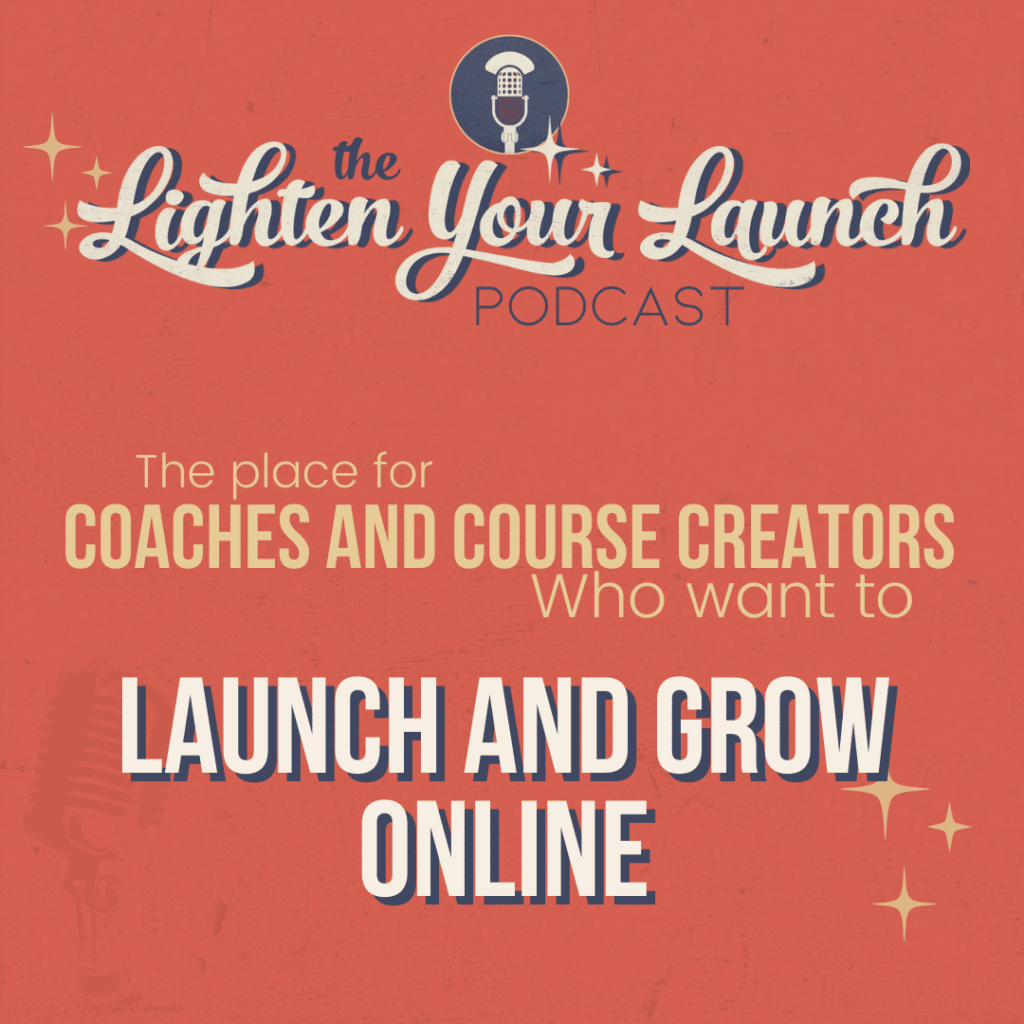
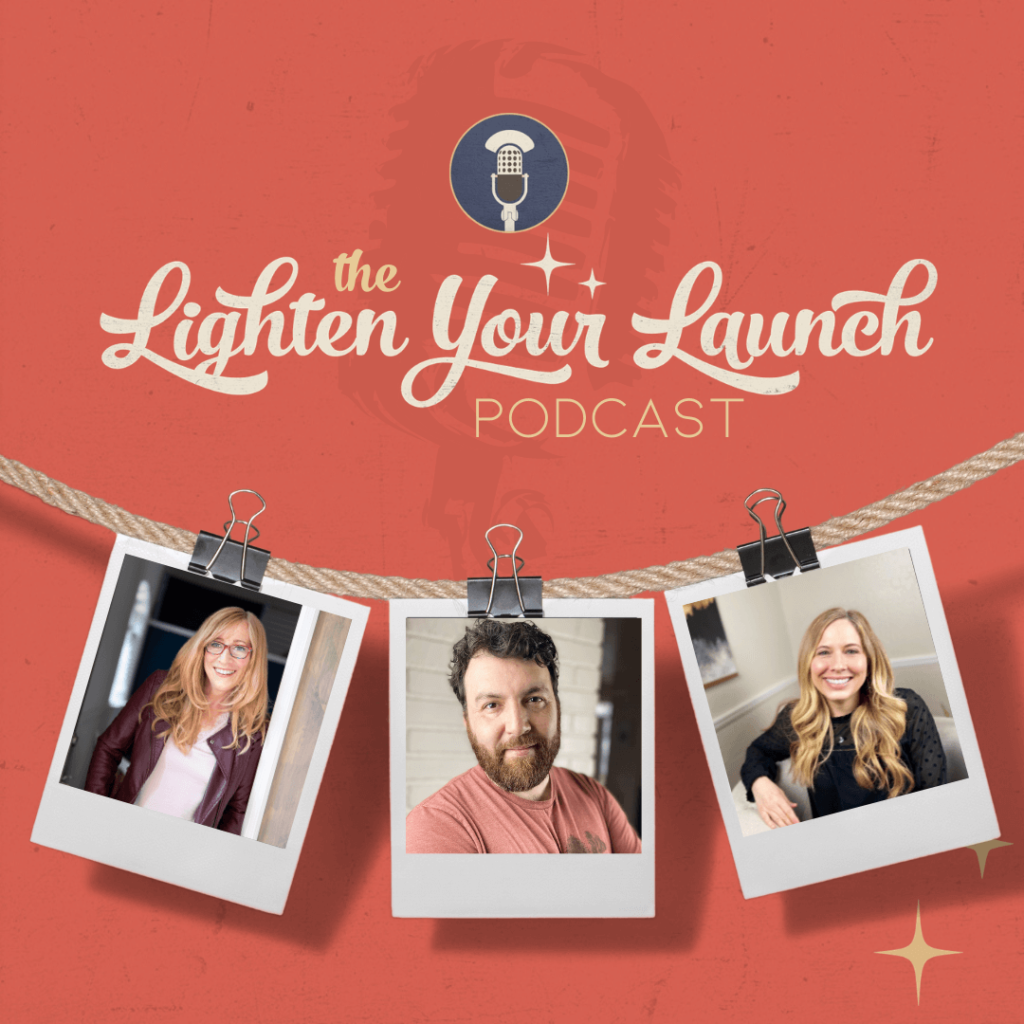


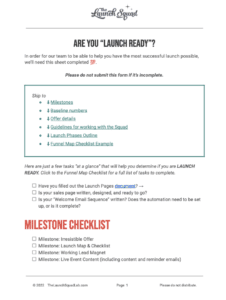
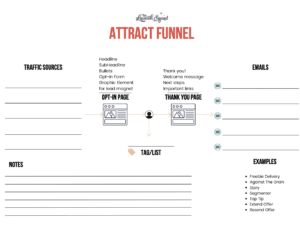
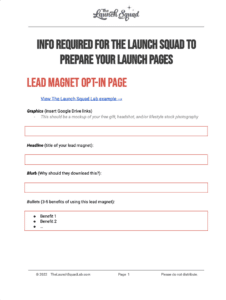
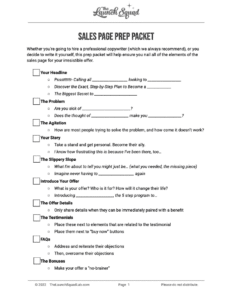
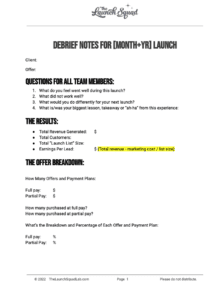
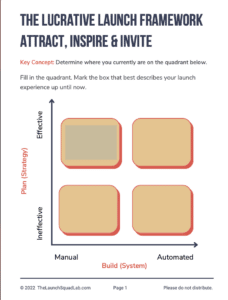
![Marketing Launch Calendar [TEMPLATE]](https://thelaunchsquadlab.com/wp-content/uploads/2023/05/Marketing-Launch-Calendar-TEMPLATE-300x260.png)
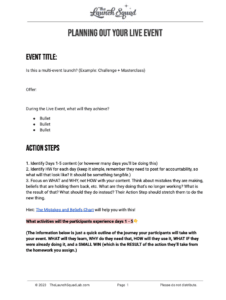
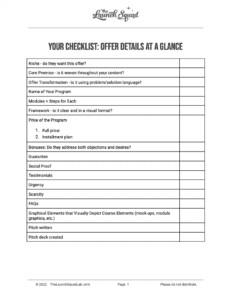
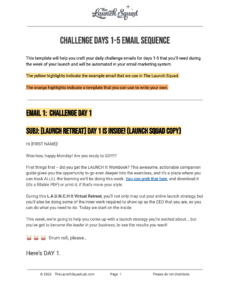
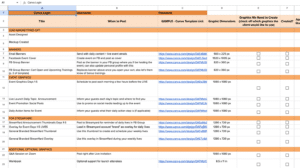
![[Updated] Email Templates for Launch](https://thelaunchsquadlab.com/wp-content/uploads/2023/05/Updated-Email-Templates-for-Launch-223x300.png)
![[REVISED] LS Pitch Script](https://thelaunchsquadlab.com/wp-content/uploads/2023/05/REVISED-LS-Pitch-Script-2023-226x300.png)

